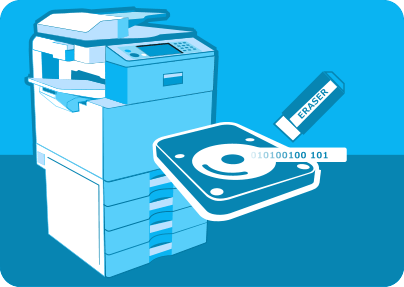What is the common risk in having your documents photocopied or scanned at your local copy center, having your medical records faxed to you, and passing on or disposing of digital copy machines you own and use in your office? Read on to find out how copiers can be a source of trouble both for owners and copy center customers.
It might come as a surprise, but most digital copy machines have powerful hard drives, just like computers do. Hard drives help them work faster by enabling multi-tasking or job queuing. But hard drives also store digital image copies of everything these multifunctional devices copy, print, scan, or email. And just like it is risky to leave sensitive information on computer hard drives unerased, it is a serious privacy hazard to do the same when it comes to copy machines.
Just imagine the array of important documents, full of sensitive data, that pass through them each day. Employees' personal details including credit card numbers and social security numbers, resumes full of personal details, details of business partners, birth certificates, income tax forms and so on. And all that becomes easily available to someone who manages to lay his hand on a machine's unerased hard drive. In fact, that is much easier to manage than you may think. It is very likely that many second hand copiers out there have an unerased hard drive, and if you just sold yours, it might already be in the hands of an expert hacker. All they need to do is a bit of DIY to remove the hard drive, and then it only takes a free recovery software tool available on the Internet to access all the data stored on the drive.
To prevent possible data theft from unerased copy machine hard drives, a New Jersey Bill has been passed. New Jersey Assembly Bill A-1238 requires digital copy machine owners to destruct, or to arrange destruction of data stored on devices before they get passed on. If you own one, it is highly advisable to comply with this regulation, as noncompliance, whether it is willful or unknowing, can have costly consequences. That may include to pay a fine of up to $2500 for the first offence and $5000 for subsequent offences.
The first thing to do is double-check if your copier does have a hard drive. You might be one of the lucky few who uses one that works without it. You can check it with your manufacturer or with an IT professional friend, but the truth is that nearly all copiers manufactured after 2002 have a hard drive. Once you are sure that your machine indeed has a hard drive, you should erase all its data if you are about to pass it on or plan to get rid of it.
east-tec DisposeSecure does not only erase PC hard drives in compliance with International standards and regulations, but it can be used to erase any hard disk connected to your computer. Follow these steps for secure, relevant regulation compliant data erasure of your copier hard drive.

